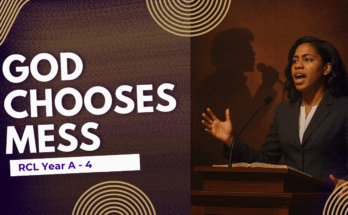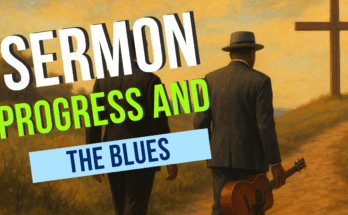As an Amazon Associate I earn from qualifying purchases.
OK, let’s get into some sermon philosophy. The question for today, “Can you write a sermon down?”
You may think so, but I am not talking about whether to use a manuscript in preaching.
No, this question gets at a fundamental idea that I hope can help your preaching. That idea is that preachers do not write down a sermon. They write down ideas and thoughts to help them in the sermon moment. Some preachers write down everything they will say, but that is still not a sermon until you are in the preached moment when the sermon is delivered.
Sermon More Than Words
 We must remember that the sermon encompasses everything we say, but it also includes things that we do not say. It also includes things that we imply. It includes the head movement or smile at just the correct time. It includes the all of the mannerisms of the preacher. It includes the shout of the preacher as the preacher gets excited about the point.
We must remember that the sermon encompasses everything we say, but it also includes things that we do not say. It also includes things that we imply. It includes the head movement or smile at just the correct time. It includes the all of the mannerisms of the preacher. It includes the shout of the preacher as the preacher gets excited about the point.
So even if the preacher writes down everything that the preacher will say with her or his mouth, that preacher is still not writing down everything the people will experience during the sermon.
People Are Sermon Helpers
But it ain’t just the preacher who is involved in the sermon moment. The people are also helpers in the preaching moment. Now I always talk about how the people should help us in preparation, but this is different, I am talking about the people helping us in the preached moment.
Some preachers ignore the people, while others probably give undue influence to the people in attempts to extract a “shout.” But be that as it may, the people help craft the sermon during the sermon event.
A congregational look of not understanding the point can cause the preacher to veer into more explanation of a point than the preacher planned. The death of a mother in the church might change the orientation of the preacher to the text under consideration. If not that, it might at least change the illustrations the preacher planned. Maybe you were going to use death as a metahpor and now you use a different metaphor, or maybe you apply the metaphor differently, or maybe you just slightly change it. Even if the meathpor is unchanged from the plan, the people may hear it differently because of the experience that has just happened this week.
Yes the people are invovled in the preaching event. Whether it is in shouting, crying, or even silently contemplating (and then living during the week) the point of the sermon.
You Need Supernatural Help As Well
The Holy Spirit also changes us up as well. How many of you have been preaching and then a point that you never considered comes to mind? The point fits better than what you planned to say. The Holy Ghost is talking to you. Always be open to what the Holy Ghost is saying to you.
Now I can hear someone saying that this could lead to preaching foolishness in the pulpit. And that is true. A preacher must have prepared adequately before the preacher can hear that voice and know that it is in line with the text under consideration. But if you have prepared then you should be able to know if the thought is in line with the text and the sermon and the event.
Why Does This Matter
Well we must recognize that our sermon is a living thing that happens at the intersection of the preacher, people, and Holy Ghost. It is a partnership between the three.
As we put our sermons together, let us remember that we must still be open to the leadings of the Spirit. We should also remember to be open to receiving the help of the congregation. The sermon is not something you write out, it is something that is experienced with and through the people of God as enlightened by God’s Spirit.
And when God shows up, or the people help you in a special way, remember to capture that in your notes before filing the sermon notes away. So the next time you preach the sermon, you can be enlightened by what happened on this day.
Amazon and the Amazon logo are trademarks of Amazon.com, Inc, or its affiliates.






When preparing a sermon there is always a creative process of birthing a sermon. O.C. Edwards Jr. calls it “Wandering Thoughtfulness”: A term coined by Eugene Lowry that refers to the phase of sermon preparation that involves letting sermon ideas incubate and crystallize in the unconscious before performing further conscious analysis and development. Dr. William Turner calls it scribbling in his creative process.
In the performance of the preaching, it is critical that the homiletical exegesis is perichoretic.. That is when our words and Gods word dance, but we have to remember to let Gods words lead the dance in performing the preached word.
I am glad you defined “perichoretic” for me cause I was sure bout to pull out my dictionary…I guess I still have to to learn the pronunciation…lol
Thanks for the comment…
Let us all say “Amen!” to this article.
I would like to underscore about listening to the Holy Spirit, and add that foolishness can be prevented if the preacher remembers the attributes of Holy Spirit: very well mannered.
I offer an illustration to what I mean. Recently in the absence of the senior pastor, a junior minister was selected to preach the Sunday morning sermon. She had prepared a text on faith but mid-delivery began berating the congregation about holiness, fornication, and sexual mores, then tried to force a guilt-induced altar call. When I spoke with her afterwards she told me that Holy Spirit had told her to preach on holiness.
Okay…but what was with all that foolishness? Not only did she preach a pastoral message which, as a junior minister she was not supposed to do (my pastor reserves the right to deliver pastoral sermons; junior ministers are supposed to deliver encouraging sermons), but she also preached tactlessly by using terms and phrases that our senior pastor would never have spoken across the pulpit, and that the children in the pews should not have heard in the manner she used them. Male and female, preachers and congregants alike were abhorred by the way the message was delivered.
I am not judging whether or not Holy Spirit directed her to preach on holiness, I just do not believe that she preached in a way that was fitting with Holy Spirit’s nature.